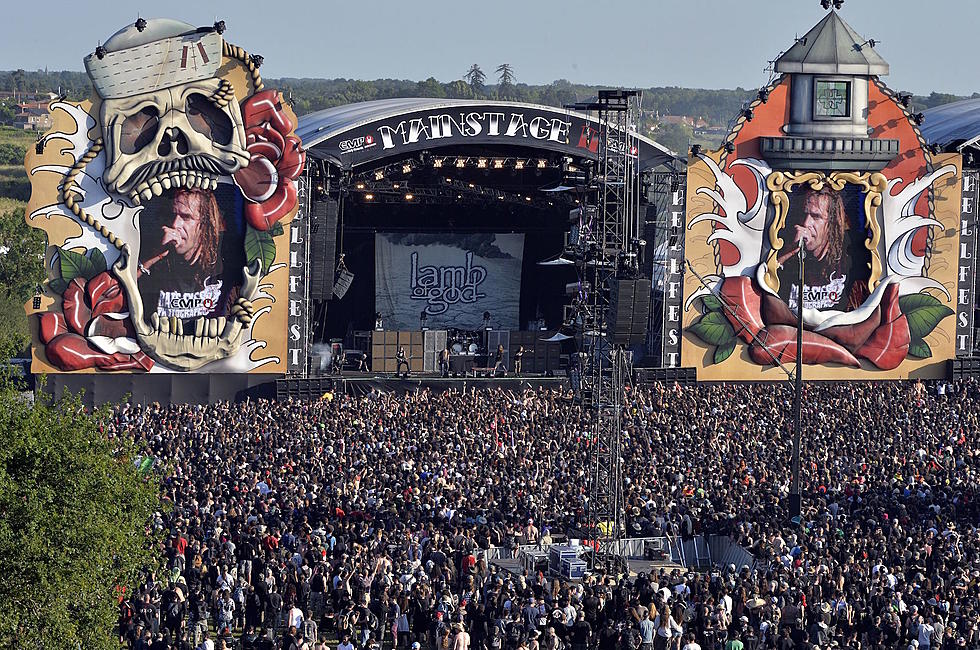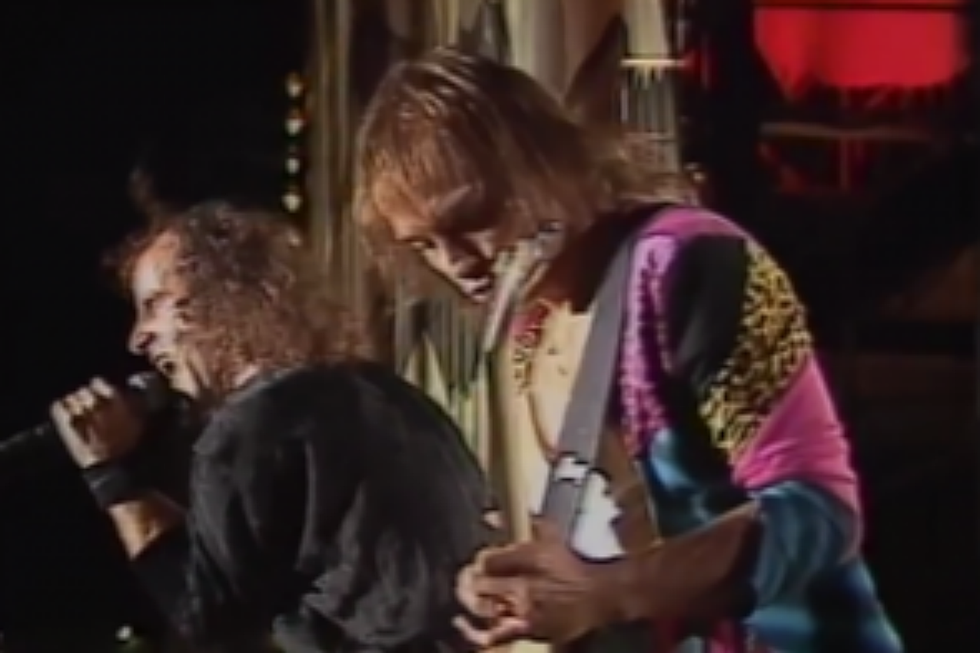
Scorpions’ Upcoming ‘Rock Believer’ Was Almost a Double LP: Exclusive Interview
Seven years removed from their last studio album, the members of the Scorpions found themselves with no shortage of new music. Fueled by the luxury of time, thanks to the pandemic, the band recorded so many songs that they considered releasing a double album.
They ultimately abandoned that idea, but fans can still enjoy most of what emerged from those sessions. Rock Believer, the German group's 19th studio record together, will be released on Feb. 25. The standard edition features 11 tracks, with a deluxe option adding five more.
Songs like "Peacemaker" find Scorpions reaching back to their roots; they even mine the more progressive hard rock of their '70s era with "Seventh Sun." We joined vocalist Klaus Meine and guitarist Matthias Jabs recently on Zoom to discuss Rock Believer.
It's been 50 years since you released your first album, and you're celebrating that milestone by releasing new music.
Klaus Meine: To be honest, we don’t think about it too much. It’s great and it’s amazing we’re still alive. We’re still around and creating new music. When you think about it, that’s amazing, you know? But you don’t want to think about those 50 years, really. [Laughs.]
But it’s a lot of mileage, you know. It’s been an amazing journey from Lonesome Crow in ‘72 up to Rock Believer in ‘22. It’s been an amazing journey with many highs, a couple of lows. But we’re still around. The most important thing is that we still enjoy creating something new to be up on stage and play for our fans. We haven’t lost that passion at all. If it’s up to me, another 50 years would be cool. [Laughs.]
Matthias Jabs: Yeah, we are basically looking forward all of the time. We need to be reminded of our, you could say, “great career,” over the many decades. It’s been a fantastic career, but we don’t really spend much energy on looking back to the past. Unless we see a documentary about ourselves where we go, “Oh, yeah, okay we’ve done that too!” We’re much more focused on what we do now and what is coming up with the new album, the tour and this is what we are really thinking about.
Klaus, what are your memories of working on that very first album, Lonesome Crow, in 1972?
Klaus: We were kind of looking for a studio, really. Our very first experience was more like a studio run by a music lover in somebody’s basement. It was not a real studio. Even back then, we had some special effects like reverb and stuff. In this so-called studio, when we had our first session there, they didn’t have anything like that. We realized, we were off on a wrong start here. It’s not a good idea.
So we were looking for a professional place. I think Rudolf Schenker found it in Hamburg, Star Studios. Conny Plank was the engineer and he was the guy who recorded the first Scorpions album – and he was somebody who at the time, was very experienced and very passionate about the music. He worked with bands like Kraftwerk, for example. So we were in Hamburg at the right place. It’s amazing, we recorded Lonesome Crow and it took us only a week, including the mix. Conny was taking care of our first record contract with Metronome Records in Hamburg, as well.
We were lucky that we had the chance to work with Conny Plank, who was a really special producer. He had the right ears. There was a great vibe between us. It felt great, even though we were totally newcomers. Being thrown into a real professional studio was a great challenge for these young kids from Hanover. I think we found our way well through the material. The songs were well-rehearsed anyway, so it was cool with us.
Listen to Scorpions Perform 'In Search of the Peace of Mind
Rock Believer is the new album, and "Peacemaker" is the first thing that fans heard from the record. How did that one come together?
Matthias: Paweł [Mąciwoda], our bass player, came up with the song. He had the original idea and it was something that was super fast. It was almost unplayable. We tried and we thought, “Hmmm, it doesn’t exactly sound like Scorpions.” So we slowed it down and changed certain things and then Rudolf came up with a different chorus. We worked on that song and liked it.
It has a lot of energy and we thought, “Yep, this could be one of the many songs. Maybe it goes onto the album.” We were not sure at that time. Then, when the record company came to the studio to listen, where Klaus is sitting now. They spotted it and loved it and they said, “Okay, that has to be on the album.” And we don’t mind, because it’s a great song. But we had 19 or 20 to choose from, so at that time, we were not really sure what the final 12 or 13 were going to be.
But they were 100% sure, so we just said, “Okay, great.” Any song of the ones that we recorded is good for the album. This one is now the first single. We just did a video and obviously, you repeat the song again and again [filming the video] and that shows you that it never gets boring. So it’s a very good song.
"Seventh Sun" is another song from the new album that has such a classic Scorpions feel to it.
Klaus: It has a vibe of songs like “Animal Magnetism” or “China White.” We were really [looking] to make an album with the old Scorpions DNA in a way, to go back to this kind of vibe. This track, I think it’s almost six minutes! [Laughs.] It’s a pretty long one.
This is like a real album track, you know? But it starts with those guitar tones and has a special vibe. It creates a Far East vibe, in a way. But when it comes to the lyrics, I think that song is free for interpretation. It’s like a modern painting in a way, throwing colors at the wall. Everybody can dive deep into this kind of feeling and come up with their own interpretation of it.
You had this goal to make an album that would sound classic like Blackout and even further back than that, Love Drive. That's music to Scorpions' fans' ears. What was the key to achieving that?
Klaus: I think part of it is definitely having the band in one room, playing all together. In modern times, we’re all used to all of those wonderful Pro Tools sessions. Basically, I could do the vocals in this place and Matthias could play his guitar in his studio at home, or the other way around. I did a lot of basic tracks and the pre-production vocals in my own place – before I came here to Peppermint Park, where we recorded the album finally.
But to have the band in one room together and to play together and to feel it together, I think that makes such a difference. Especially with a drummer in the band like Mikkey Dee, who joined up in 2016. The songs feel very different and it’s like you’re setting yourself for performing live and you figure out, “this would be a great song for our setlist.” You play it live in the studio and I think it’s a big difference [compared to] working in other ways.
Matthias: Also, we started out thinking that we would produce this album with Greg Fidelman (Metallica, Black Sabbath, Slipknot) who we met when we played in Los Angeles. He came to our hotel. He came over to look at this studio [Peppermint Park], but then the pandemic hit.
We were trying, like we are doing it now [talking to you], through Zoom. It worked to a certain extent. He could hear us and we could hear him listening to our basic tracks and we all had iPads next to our faces in the recording room. We did everything that we could. But you know, with a nine-hour [time] difference, he couldn’t come over to us: He stayed in Los Angeles. We couldn’t travel to California, or the U.S. in general. It meant we were already tired from a long day. He just woke up. We’d see him in the morning with his coffee in his hand.
You can only do that for a certain time and then we decided, there’s no point. You need to be in the same room with the musicians. So we decided to do it by ourselves. I think this even made it more of a Scorpions album than if you have any producer who has his influence onto the music and the sound. I’m pretty sure this is a big factor [in why] we sound like we sound now.
Watch the Video for 'Peacemaker' by Scorpions
Originally, you planned to not have any outside writers. It seems like you mostly stuck with that.
Klaus: There are songs like “Seventh Sun,” for example, where we have outside writers involved, or “Shining of Your Soul.” But that’s pretty much it. You know, it’s very much an album where the compositions are by Rudolf Schenker and I did the lyrics for the entire album, as far as I can remember. So it’s very much, in that sense, a Scorpions album where we were not having outside writers that came in with songs. We just took those songs and maybe I wrote a couple of lines in the lyrics or whatever. No, this is very much a Scorpions album with almost 100% Schenker/Meine compositions.
Matthias, you’ve mentioned that there were 18 or 19 songs in contention for this album. Was there ever a thought about doing a double album?
Matthias: Yeah, we talked about it, but then we thought, “Hmmm, maybe not.” We were trying to [figure out], “Okay, what do we do with all of those songs? Then, the record company came in and said, “Okay, 12 should be the maximum for the CD. But what do we do with all of the others?”
Some songs are written specifically for our fans in certain countries – not for all of the countries, but a few. So those were considered to be bonus tracks from the start. But now, the solution is that the basic CD, the standard one, has 11 songs. The deluxe version has 16 songs and then we have three bonus tracks left, the ones that I just mentioned, for certain countries.
Klaus: There was so much music. Some of the songs, when we heard the demos, the demos were already pretty cool. It was like, “Awww, do I have to sing this again? C’mon, no. It’s pretty cool the way it is!” “No, no, no, c’mon, Klaus, you have to do it again.” Hans-Martin Buff, in the end, we produced this record together, but he was really demanding also and pushing everybody for the best performance.
I think in the end, we have a great album. Like Matthias said, there was a moment where we thought this could be a double album [or] maybe save those songs and two years from now, write a couple more for another amazing album. But this is now, and we wanted to give this to our fans and share those songs with the world.
This is Mikkey Dee's first album with the band. He brings a heavy history, having spent a bunch of years with Motorhead. What did he add to this record?
Matthias: Mikkey is an excellent drummer. He really knows what he’s doing. We were playing with quite a few drummers throughout our history, but he’s definitely the one who is very, very musical. He knows exactly what he does and in which part of the song, like a year later! We just recorded the videos and he knew exactly which break and which roll and whatever he did. He’s very conscious about his drumming. He sees it as a musical arrangement, not only a beat.
It was actually great to do all of the basic tracks with him, and he has good ideas for endings and little stuff in between. He’s really very much involved and it’s great fun. We’re together now for a couple of years already, playing live around the world and it’s such a great feeling to have a drummer like this, because he’s so reliable and so energetic. You never have any doubt when you go on stage about something going wrong. He is just right there where you need him.
Scorpions Albums Ranked
More From 102.9 WBLM










